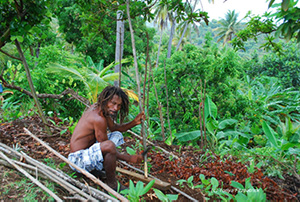Create Organic Cosmetics at this Women-Led Coop on Spain’s Camino de Santiago

Farmhouse on the Camino de Santiago Photo: Anna Staropoli
Posted November 1, 2024
Deep in Green Spain, on a quiet, residential street in Palas de Rei, a narrow stone block stands tall, engraved with a blue square and yellow seashell — the telltale sign of Spain’s Camino de Santiago. Here, the well-trafficked pilgrimage route intersects with a stone farmhouse, robust herb garden, and outdoor tienda. These components form the Milhulloa Coop, where pilgrims can purchase — or make — herb-based toiletries, cosmetics, and even a drink, all without veering off-course.

Chusa Expósito and Carmela Valiño Photo: Anna Starpoli
Organic Plants Benefit Pilgrims on the Camino
The coop began in 2001 as a joint effort between Chusa Expósito and Carmela Valiño. With backgrounds in pharmacy, biology, and business, the duo converted Expósito’s family farm into a 24-acre, Camino-centric coop. In addition to the farmhouse where Expósito and Valiño make, dry, and store their products, this acreage houses vegetables, herbs, bonsai trees, and the occasional strutting chicken.
“We organically grow plants that are native to Galicia or a similar habitat,” explained Valiño. These plants include the likes of cornflower, plantain, yarrow, chamomile, and fennel, among others. Though it’s not just herbs that have proven useful. Valino and Exposito use the flowers of Galicia’s green turnips to create a lip balm.
Likewise, mint plays a major role on the farm; the coop’s laboratory offers classes that include toothpaste-making. Visitors harvest toothpaste’s trademark ingredient, as well as sage and thyme, before making an infusion with the three herbs. That infusion is then mixed with white clay and peppermint essence for dentrifico straight from the source.
In addition to laboratory classes, the coop operates tours and tastings, all with the intent to educate those who come to Galicia. The shop also sells herb-based drinks — there’s one with mint and yarrow — and pre-made cosmetics that range from hair care to face creams. You can also scoop up organic spices, teas, dehydrated vegetables, and massage oils.
Yet while the focus now lies largely on cosmetics, Valiño and Expósito started the coop by making ointments and salves, compiling a book of recipes from medieval hospitals. “Nowadays, many of our preparations are aimed at pilgrims,” said Valiño. After however many days and miles on the Camino, pilgrims are likely to need a refill on toothpaste or a vial of massage oil to combat soreness.
An Opportunity to Connect to the Land
Even if you’re not hiking, the coop occupies a distinctive place in Galicia, affording visitors an opportunity to connect with the land. Pilgrims physically traverse the Camino — whether by foot or by bike — from point A to point B. While not a pilgrimage, cutting vegetables and muddling herbs allows tourists to glean insight into Galicia’s resources, engaging with the land in a less physically intensive, but no less traditional, way.
Given their business model, it’s not surprising that Valiño and Expósito are all about protecting Galicia. Beyond discussing the coop, they echoed the recent concerns of Spanish environmentalists, who have spoken out against government-supported plans for a cellulose project on adjacent lands. “It would be an ecological disaster for the environment and the agroecological economy of the entire region,” said Valiño. On the road outside the farmhouse, there’s a sign protesting this very endeavor.

Lavender Field Photo: Anna Starpoli
The Heart of Galicia
After all, it’s the land that, in many ways, comprises the heart of the region. It entices pilgrims, tourists, and even new residents to linger. Kelli Field, one of the coop’s neighbors, moved to Spain just a few years ago. “I was drawn here by its beauty,” she said. “The clean air and the pristine landscape. Its endless carpet of green.”
Field’s attitude holds up even on less-than-sunny days. If you’re unfamiliar with the area, it’s easy to associate Northwest Spain with the country’s better-known Mediterranean landscapes, but lush, mountainous Galicia has something of a reputation: “Some are put off by the rain,” admits Field, “but it’s the rain that creates such beauty.”
It’s also the rain that helps the coop’s herbs grow, underlying every lavender tea, turnip-infused lip balm, and minty toothpaste. To visit the coop for yourself, you’ll find the farmhouse at Coto, n°1 27204 Palas de Rei — though a GPS isn’t necessary if coming by foot. All you have to do is walk the way of St. James.

Milhulloa
Click Here to Find Discounted Accommodations in Galicia, Spain
Join the community!

Join our community to receive special updates (we keep your private info locked.)




